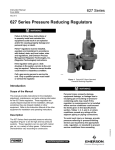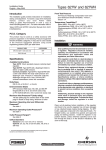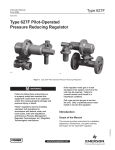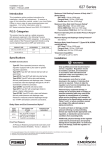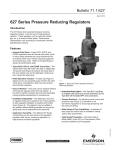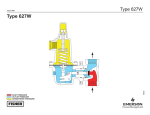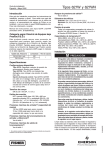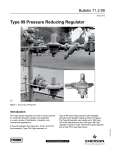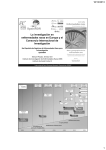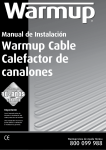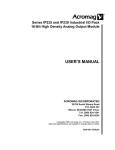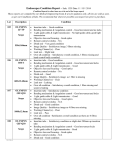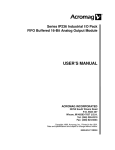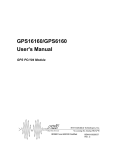Download Emerson 627W Instruction Manual
Transcript
Types 627W and 627WH Instruction Manual Form 5447 March 2009 Types 627W and 627WH Direct-Operated Pressure Reducing Liquid Regulators ! Warning Fisher® regulators must be installed, operated, and maintained in accordance with federal, state, and local codes, rules and regulations, and manufacturer’s instructions. Installation, operation, and maintenance procedures performed by unqualified personnel may result in improper adjustment and unsafe operation. Either condition may result in equipment damage or personal injury. Use qualified personnel when installing, operating, and maintaining the Types 627W and 627WH regulators. Introduction Scope of the Manual This Instruction Manual provides installation, startup, adjustment, maintenance, and parts ordering information for the Types 627W and 627WH pressure reducing regulators for liquid service. Only personnel qualified through training or experience should install, operate, and maintain these regulators. If there are any questions concerning these instructions, contact your local Sales Office before proceeding. Description W4793 Figure 1. Types 627W and 627WH Pressure Reducing Liquid Regulator The Types 627W and 627WH (Figure 1) are directoperated pressure reducing regulators for liquid service. On the internal registration version, downstream pressure is registered internally through the body to the underside of the diaphragm. seal and a 1/4 NPT control line connection in the diaphragm case. The stem seal separates the body outlet pressure from the diaphragm case. Types 627W and 627WH direct-operated regulators are also available in a downstream control line version for external pressure registration. The control line version has a blocked throat with an O-ring stem Refer to Specifications lists for Types 627W and 627WH constructions on page 2. Specifications for a given regulator as it originally comes from the factory are stamped on the spring case nameplate. D102504X012 Specifications www.emersonprocess.com/regulators Types 627W and 627WH Specifications Available Construction Orifice Sizes Type 627W: Direct-operated pressure reducing liquid regulator (Figure 2) Type 627WH: Type 627W with a diaphragm limiter to deliver a higher outlet pressure (Figure 2) Control Line Option: Type 627W or 627WH with a stem seal between the body outlet pressure and diaphragm case. Pressure is measured under the diaphragm through the 1/4 NPT downstream control line connection (Figure 2) Body Sizes and End Connection Styles Temperature Capabilities See Table 4 Pressure Registration Standard: Internal Optional: External through 1/4 NPT control line connection in the diaphragm case Spring Case Vent Connection 3/4 NPT with removable screened vent assembly NPT: NPS 3/4, 1, or 2 CL150, CL300, CL600 RF Flanged: NPS 1 or 2 (DN 25 or 50) PN 16/25/40: NPS 1 or 2 (DN 25 or 50) Maximum Spring and Diaphragm Casing Pressure(1) See Table 1 Body Pressure Shell Rating (1) NPT (Steel): 2000 psig (138 bar) NPT (Ductile Iron): 1000 psig (68,9 bar) CL600 RF Flanged (Steel): 1500 psig (103 bar) Elastomer Temperature Ranges(1) See Table 4 Control Line Connection 1/4 NPT downstream control line connection Wide-Open Cv and IEC Sizing Coefficients See Table 5 Maximum Operating Inlet and Outlet Pressure Ranges(1) See Table 2 for pressures by orifice and spring range Approximate Weight 10 pounds (5 kg) Option Outlet Pressure Ranges Standard: 1/4 or 1/2-inch (6,4 or 13 mm) Optional: 3/32,1/8, 3/16, or 3/8-inch (2,4; 3,2; 4,8; or 9,5 mm) See Table 8 Type 627W: 10 to 150 psig (0,69 to 10,3 bar) Type 627WH: 140 to 500 psig (9,7 to 34,5 bar) See Table 2 for pressures by orifice and spring range Outlet Pressure Gauge (Brass): 0 to 30 psi (0 to 2,1 bar) 0 to 60 psi (0 to 4,1 bar) 0 to 160 psi (0 to 11,0 bar) 0 to 300 psi (0 to 20,7 bar) 0 to 600 psi (0 to 41,4 bar) 1. The pressure/temperature limits in this Instruction Manual or any applicable standard limitation should not be exceeded. Table 1. Maximum Spring and Diaphragm Casing Pressure(1) TYPE 627WH DIAPHRAGM CASING material Psig bar Psig bar Maximum pressure to spring and diaphragm casings to prevent leak to atmosphere (internal parts damage may occur) Ductile iron 250 17,2 ---- ---- Steel or Stainless steel 250 17,2 800 55,2 Ductile iron 465 32,1 ---- ---- Steel or Stainless steel 1500 103 1500 103 All materials 60 4,1 120 8,3 Maximum pressure to spring and diaphragm casings to prevent burst of casings during abnormal operation (leak to atmosphere and internal parts damage may occur) Maximum diaphragm casing overpressure (above setpoint) to prevent damage to internal parts 1. If the spring case is pressurized, a metal adjusting screw cap is required. Contact your local Sales Office for details. 2 TYPE 627W MAXIMUM PRESSURE DESCRIPTION Types 627W and 627WH SCREENED VENT ASSEMBLY ADJUSTING SCREW CAP ADJUSTING SCREW SPRING CASE CONTROL SPRING 1/4 NPT CONTROL LINE CONNECTION INTERNAL REGISTRATION DISK ASSEMBLY DIAPHRAGM PUSHER POST W6483-2 W6306-1 DETAIL OF TYPE 627W WITH EXTERNAL DOWNSTREAM PRESSURE REGISTRATION DETAIL OF TYPE 627W WITH INTERNAL DOWNSTREAM PRESSURE REGISTRATION ADJUSTING SCREW CAP ADJUSTING SCREW SCREENED VENT ASSEMBLY SPRING CASE 1/4 NPT CONTROL LINE CONNECTION CONTROL SPRING DIAPHRAGM LIMITER O-RING DIAPHRAGM head INTERNAL REGISTRATION DISK ASSEMBLY DIAPHRAGM LIMITER DIAPHRAGM PUSHER POST W5482-1 W6305-1 DETAIL OF TYPE 627WH WITH INTERNAL DOWNSTREAM PRESSURE REGISTRATION DETAIL OF TYPE 627WH WITH EXTERNAL DOWNSTREAM PRESSURE REGISTRATION AND CONNECTION FOR OUTLET PRESSURE GAUGE Figure 2. Types 627W and 627WH Construction Details 3 Types 627W and 627WH Type 627W July 2008 Type 627W M1037 M1037 inlet INLETpressure PRESSURE OUTlet pressure OUTLET PRESSURE ATMOSPHERIC pressure ATMOSPHERIC INLET PRESSURE PRESSURE OUTLET PRESSURE ATMOSPHERIC PRESSURE Figure 3. Type 627W Operational Schematic (Also Typical of Type 627WH) Principle of Operation The Type 627W or 627WH (refer to Figure 2) is a direct-operated regulator. On the internal registration version, downstream pressure is registered internally through the body to the under side of the diaphragm. When the downstream pressure is at or above the set pressure, the disk is held against the seat, and there is no flow through the regulator. When demand increases, downstream pressure drops slightly allowing the spring to extend, moving the stem down and the disk away from the seat. This allows flow through the body to the downstream system. Types 627W and 627WH direct-operated regulators are also available in a downstream control line version. This version has a stem seal between the body outlet pressure and diaphragm case. Pressure is registered under the diaphragm through the 1/4 NPT downstream control line connection (Figure 2). Installation ! Warning Personal injury, equipment damage, or leakage due to escaping liquid or bursting of pressure-containing parts may result if this regulator is overpressured or installed where service 4 connection could exceed the limits given in Tables 1, 2, and 4 or where conditions exceed any ratings of the adjacent piping or piping connections. To avoid such injury or damage, provide pressure-relieving or pressure-limiting devices to prevent service conditions from exceeding those limits. Additionally, the control line could be broken off the regulator by physical damage, causing personal injury and property damage due to escaping liquid. To avoid such injury and damage, install the regulators and control line where they are protected from physical damage. caution Liquid pressure control systems should be designed using engineering practices to eliminate quick control starting or stopping of the flow stream, which can produce water hammer. Regulator operation within ratings does not preclude the possibility of damage from debris in the lines or from external sources. A regulator should be inspected for damage periodically and after any overpressure condition. Key numbers referenced in this section are Types 627W and 627WH working regulator control line monitor Type 627W set higher than working regulator INLET TYPE 627W A6623 TYPE 627W Figure 4. Monitor Regulator Schematic Table 2. Maximum Inlet Pressure, Differential Pressure, and Outlet Pressure Ranges Type 627W 627WH OUTLET PRESSURE RANGE, SPRING PART Orifice Size, NUMBER, AND COLOR, Inches (mm) PSIG (bar) Maximum Inlet Pressure, Psig (bar) Maximum Differential Pressure, Psid (bar d) Elastomer Disk Nylon Disk Elastomer Disk Nylon Disk 10 to 20 (0,69 to 1,4) 10B3076X012 Yellow 1/4 (6,4) 220 (15,2) 420 (29,0) 200 (13,8) 400 (27,6) 1/2 (13) 220 (15,2) 250 (17,2) 200 (13,8) 250 (17,2) 15 to 40 (1,0 to 2,8) 10B3077X012 Green 1/4 (6,4) 240 (16,5) 440 (30,3) 200 (13,8) 400 (27,6) 1/2 (13) 240 (16,5) 300 (20,7) 200 (13,8) 300 (20,7) 35 to 80 (2,4 to 5,5) 10B3078X012 Blue 1/4 (6,4) 280 (19,3) 480 (33,1) 200 (13,8) 400 (27,6) 1/2 (13) 280 (19,3) 480 (33,1) 200 (13,8) 400 (27,6) 70 to 150 (4,8 to 10,3) 10B3079X012 Red 1/4 (6,4) 350 (24,1) 550 (37,9) 200 (13,8) 400 (27,6) 1/2 (13) 350 (24,1) 550 (37,9) 200 (13,8) 400 (27,6) 140 to 250 (9,7 to 17,2) 10B3078X012 Blue 1/4 (6,4) 450 (31,0) 650 (44,8) 200 (13,8) 400 (27,6) 1/2 (13) 450 (31,0) 500 (34,5) 200 (13,8) 250 (17,2) 240 to 500 (16,5 to 34,5) 10B3079X012 Red 1/4 (6,4) 700 (48,3) 900 (62,1) 200 (13,8) 400 (27,6) 1/2 (13) 700 (48,3) 750 (51,7) 200 (13,8) 250 (17,2) shown in Figures 5 and 6. Ensure that the operating elastomer temperature ranges listed in Table 4 are not exceeded. Like most regulators, Types 627W and 627WH regulators have outlet pressure ratings that are lower than their inlet pressure ratings. 1. Only personnel qualified through training and experience should install, operate, or maintain this regulator. 2. For a regulator that is shipped separately, make sure that there is no damage to, or foreign material in, the regulator. 3. Ensure that all tubing and piping have been blown free of foreign debris. 4. The regulator may be installed in any position as long as the flow through the body is in the direction indicated by the arrow cast on the body. 5. If continuous operation is required during inspection or maintenance, install a three-valve bypass around the regulator. ! Warning The vent line or stack opening must be protected against condensation or clogging. 6. Position the body (key 1) and/or diaphragm spring case (key 29) so it will not collect moisture or debris in the screened vent. If the regulator requires repositioning, refer to the Body Area Maintenance Procedures and/or the diaphragm case area maintenance procedures in the Maintenance section to reposition the screened vent for the application. 5 Types 627W and 627WH Table 3. Outlet Pressure Ranges SPRING RANGE COLOR SPRING PART NUMBER SPRING FREE LENGTH, INCHES (mm) SPRING WIRE DIAMETER, INCHES (mm) 0,69 to 1,4 Yellow 10B3076X012 3.19 (81,0) 0.170 (4,32) 15 to 40 1,0 to 2,8 Green 10B3077X012 3.19 (81,0) 0.207 (5,26) 35 to 80 2,4 to 5,5 Blue 10B3078X012 3.20 (81,3) 0.262 (6,66) 70 to 150 4,8 to 10,3 Red 10B3079X012 3.07 (78,0) 0.313 (7,95) 140 to 250 9,7 to 17,2 Blue 10B3078X012 3.20 (81,3) 0.262 (6,66) 240 to 500 16,5 to 34,5 Red 10B3079X012 3.07 (78,0) 0.313 (7,95) TYPE 627W 627WH Psig bar 10 to 20 Table 4. Elastomer Temperature Ranges MATERIAL TEMPERATURE RANGE DISK/DIAPHRAGM Disk Nitrile (NBR) Diaphragm Disk Fluorocarbon (FKM) Diaphragm Disk Ethylenepropylene (EPDM) Diaphragm USAGE °F(1) °C(1) -40 to 180 -40 to 82 General 0 to 300 -18 to 149 Not Recommended for Hot Water Service -40 to 275 -40 to 135 Not Recommended for Hydrocarbon Service Perfluoroelastomer (FFKM) Disk 0 to 400 -18 to 204 Corrosive Nylon (PA) Disk -40 to 200 -40 to 93 General Polytetrafluoroethylene (PTFE) Diaphragm Protector -40 to 400 -40 to 204 Corrosive 1. Stainless steel body is rated to -40°F (-40°C). Steel and ductile iron bodies are rated to -20°F (-29°C). Table 5. Flow and Sizing Coefficients ORIFICE SIZE, INCHES (mm) BODY SIZES, NPS (DN) Wide-Open CV for Relief Sizing 1/4 (6,4) 1/2 (13) 3/4 1.63 4.87 1 (25) 1.70 5.29 2 (50) 1.66 5.01 Km 1/4 (6,4) IEC Sizing Coefficients 1/2 (13) 0.76 Startup FD 1/4 (6,4) 1/2 (13) 0.592 0.962 0.543 0.815 0.620 1.01 FL 1/4 (6,4) 1/2 (13) 1/4 (6,4) 1/2 (13) 0.50 0.50 0.87 0.86 Adjustment ! Warning To avoid personal injury or property damage during startup, release downstream pressure to prevent an overpressure condition on the diaphragm of the regulator. In order to avoid an overpressure condition and possible equipment damage, pressure gauges should always be used to monitor pressure during startup. 1. Slowly open the upstream shutoff valve. 2. Slowly open the downstream shutoff valve. 3. Check all connections for leaks. 4. Make final control spring adjustments according to the adjustment procedures. 6 0.74 XT The range of allowable pressure settings is marked on the nameplate. If a pressure setting beyond this range is necessary, substitute the appropriate regulator control spring. Change the nameplate to indicate the new pressure range. Before increasing the setting, refer to Tables 1 and 2. Review the pressure limits for the control spring range being used and be certain that the new pressure setting will not result in an overpressure condition. Note Always use a pressure gauge to monitor pressure when making adjustments. Types 627W and 627WH Table 6. Maximum Torque Values Key Number Description Foot Pounds Newton Meters 2 Orifice 25 34 3 Cap Screw (with ductile iron or steel diaphragm casing) 25 34 9 (1) 18 37 Lever, Cap Screw 7 Spring Case Cap Screw (with ductile iron diaphragm casing) 7 9 Spring Case Cap Screw (with steel diaphragm casing) 35 47 Diaphragm Cap Screw (Type 627W) 7 9 Diaphragm Cap Screw (Type 627WH) 14 19 46 1. Refer to Figures 5 and 6 for key numbers. Refer to Figures 5 and 6 for key number location. 1. Remove the adjusting screw cap (key 36). 2. Loosen the locknut (key 34). 3. Increase the outlet pressure setting by turning the adjusting screw (key 35) clockwise. Decrease the outlet pressure settings by turning the adjusting screw counterclockwise. Shutdown ! Warning To avoid personal injury or property damage or damage to regulator or downstream components during shutdown, release downstream pressure to prevent an overpressure condition on the diaphragm of the regulator. 1. Close the nearest upstream shutoff valve. 2. Close the nearest downstream shutoff valve. 3. Open the vent between the regulator and the downstream shutoff valve nearest to it. Maintenance Unless otherwise specified the following maintenance procedures apply to all Types 627W and 627WH regulators. For a summary of maximum torque values, refer to Table 6. Due to normal wear, damage from external sources, or debris in the line, regulator parts such as the valve plug assembly, orifice, and diaphragm must be inspected periodically and replaced as necessary to ensure correct performance. The frequency of inspection and replacement depends upon the severity of conditions and the requirements of state and federal laws and regulations. Normal wear of the orifice and disk assembly is accelerated with high pressure drops and with large amounts of impurities in the flow stream. Instructions are given below for replacing the valve plug assembly, orifice, diaphragm, and O-rings. These procedures may also be used for disassembly required for inspection and replacement of other parts. Body Area Maintenance Procedures These procedures are for gaining access to the valve plug assembly, orifice, lower casing O-ring and stem assembly. All pressure must be released from the diaphragm casing before the following steps can be performed. While using the following procedures, refer to Figures 5 and 6 for key number location. Replacing the Valve Plug Assembly or Orifice 1. To inspect and replace the valve plug assembly (key 9) or orifice (key 2), remove the cap screws (key 3, not shown), and separate the lower diaphragm casing (key 5) from the body (key 1). 2. Inspect and, if necessary, remove the orifice (key 2). If removed, coat the threads of the replacement orifice with lubricant (key 38) and tighten to 25 foot-pounds (34 N•m). 3. Inspect the valve plug assembly (key 9) and, if necessary, remove the hair pin clip (key 13) that holds the valve plug assembly in place. If replacing the valve plug assembly is the only maintenance required, skip to step 10. Replacing the Stem Assembly If it is necessary to perform maintenance on the stem assembly, continue with steps 4 through 13. 4. Remove the stem guide (key 8) from the lower diaphragm casing (key 5). Unhook from the lever (key 15) and remove the stem (key 10) from the lower diaphragm casing (key 5). 7 Types 627W and 627WH 5. Remove and inspect the stem O-ring (key 11) and replace if necessary. Also inspect and if necessary replace the O-ring (key 44) and backup springs. 6. Remove and inspect the stem backup rings (key 12) and replace if necessary. 7. Apply lubricant to the stem O-ring (key 11). 3. Remove the diaphragm limiter (key 50) and O-ring (key 51) on the Type 627WH only. Remove the diaphragm assembly by tilting it so that the pusher post assembly (key 19) slips off the lever (key 15). 4. If it is necessary to replace the lever assembly (key 15), remove the lever cap screws (key 18). 9. Insert parts into the lower diaphragm casing (key 5) that were removed in steps 4 through 6. 5. Install the replacement lever (key 15) into the lever retainer (key 16) by inserting the lever pin (key 17). Secure the lever assembly (key 15) into the lower diaphragm casing (key 5) with the cap screws (key 18) and tighten the cap screw to 7 foot-pounds (9 N•m). 10. Install the valve plug assembly (key 9), line up the hole in the valve plug assembly and stem (key 10) and insert the hair pin clip (key 13). If it is necessary to perform maintenance on the diaphragm assembly continue with steps 6 through 10 and step 17, otherwise skip to step 11. 11. Position the diaphragm casing plus attached parts in relation to the body (key 1) so that they are correct for the application. 6. 8. For assembly, insert the stem (key 10) into the lower diaphragm casing (key 5) and hook it on the lever (key 15). 12. Secure the lower diaphragm casing to the body with the cap screw (key 3). For ductile iron or steel diaphragm casings, tighten the cap screws (key 3) to 25 foot-pounds (34 N•m). 13. It may be necessary to reposition the diaphragm spring case to prevent rain, ice, and foreign debris from entering the spring case. Refer to the Diaphragm and Spring Case Area Maintenance Procedures. Remove cap screw (key 46), lower spring seat (key 31 for Type 627W only, Figure 5) and diaphragm head (key 24). On the Type 627WH remove O-ring (key 52, Figure 6). Separate the diaphragm (key 23) from the pusher post (key 19). 7. Install the diaphragm (key 23), in reverse order of step 6. On the pusher post (key 19), insert and finger tighten the cap screw (key 46). 8. Hook the pusher post (key 19) on the lever (key 15), then turn the diaphragm (key 23) to match the holes in the diaphragm with the holes in the lower diaphragm casing (key 5). Diaphragm and Spring Case Area Maintenance Procedures 9. Unhook the pusher post (key 19) from the lever (key 15) and tighten the cap screw (key 46) to 7 foot-pounds (9 N•m). These procedures are for gaining access to the control spring, diaphragm assembly, and lever assembly. All spring pressure must be released from the diaphragm casing before these steps can be performed. 10. Hook the pusher post (key 19) on the lever (key 15) and check the hole alignment. If necessary, loosen the cap screw (key 46) and reposition the diaphragm (key 23) on the pusher post (key 19). Tighten the cap screw to 7 footpounds (9 N•m). While using the following procedures, refer to Figures 5 and 6 for key number locations. 1. Remove the adjusting screw cap (key 36), loosen the lock nut (key 34), and turn the adjusting screw (key 35) counterclockwise until all compression is removed from the control spring (key 32). 2. Remove the cap screws (key 37), and lift off the spring case (key 29). If changing the spring (key 32) or repositioning the spring case is the only maintenance required, install the replacement spring (key 32) or rotate the spring case so it is correct for the application. Skip to step 13. For diaphragm area maintenance, continue with step 3. 8 11. Insert the diaphragm assembly into the lower diaphragm casing (key 5). 12. Install the spring (key 32) and upper spring seat (key 33), and apply lubricant to the upper spring seat. 13. Install the spring case (key 29) so that the vent (key 30) is in the correct position for the application. Insert the cap screws (key 37) and finger tighten. 14. Screw in the adjustment screw (key 35) to put slack into the diaphragm (key 23). Types 627W and 627WH Table 7. Body (Key 1) END CONNECTION STYLE NPT Cl150 RF CL300 RF CL600 RF PN 16/25/40 BODY MATERIAL Ductile Iron (Type 627W only) WCC Steel CF8M Stainless Steel WCC Steel CF8M Stainless Steel WCC Steel CF8M Stainless Steel WCC Steel CF8M Stainless Steel WCC Steel CF8M Stainless Steel NPS 3/4 30B3046X012 30B3050X012 30B3050X062 ------------------------- NPS 1 (DN 25) 30B3048X012 30B3051X012 30B3051X092 43B8656X022 43B8656X052 41B8978X012 41B8978X072 40B6754X012 40B6754X102 44B0386X012 44B0386X032 NPS 2 (DN 50) 30B3096X012 30B7452X012 30B7452X052 44B0666X012 44B0666X022 41B8080X012 41B8080X072 40B6756X012 40B6756X062 44B3342X012 44B3342X032 Table 8. Orifice (Key 2) ORIfiCE DIAMETER Inches 3/32 1/8 3/16 1/4 3/8 1/2 PART NUMBER mm 2,4 3,2 4,8 6,4 9,5 13 303 Stainless Steel 0R044135032 1A936735032 00991235032 0B042035032 0B042235032 1A928835032 15. Using a crisscross pattern, tighten the cap screw (key 37) to 7 foot-pounds (9 N•m). 16. If necessary, refer to the installation and/or the startup and adjustment procedures. 17. Install the adjusting screw cap (key 36) after regulator adjustment. Parts Ordering When corresponding with your local Sales Office about this equipment, always reference the information found on the regulator nameplate. When ordering replacement parts, reference the complete 11-character part number of each needed part as found in the following parts list. Parts List Key Description Part Number 1 Body (See Table 7) 2* Orifice (See Table 8) 3 Cap Screw (2 required, Not shown) Ductile iron or steel spring case and diaphragm casing (plated steel cap screw) Stainless steel spring case and diaphragm casing (SST cap screw) 5 Lower Diaphragm Casing Type 627W Ductile iron WCC Steel CF8M Stainless steel 1A560724052 1A5607X0052 30B3053X012 30B3104X012 30B3104X082 316 Stainless Steel 0R0441X0012 1A9367X0022 009912X0012 0B0420X0012 0B0422X0012 1A9288X0012 Key Description 5 Lower Diaphragm Casing (continued) Type 627W with control line or 1/4 NPT Tap Ductile iron WCC Steel CF8M Stainless steel Type 627WH WCC Steel CF8M Stainless steel Type 627WH with control line or 1/4 NPT Tap WCC Steel CF8M Stainless steel Part Number 39A5987X012 30B8734X012 30B8734X032 30B3104X012 30B3104X082 30B8734X012 30B8734X032 8 Stem Guide, 316 Stainless steel Standard With control line 14B7259X012 10B3085X012 9* Valve Plug Assembly Stainless steel/Nitrile (NBR) Stainless steel/Nylon (PA) Stainless steel/Fluorocarbon (FKM) Stainless steel/Ethylenepropylene (EPDM) Stainless steel/Perfluoroelastomer (FFKM) 1C4248X0202 1C4248X0062 1C4248X0052 1C4248X0302 1C4248X0392 10 10B3059X012 Stem, 416 Stainless steel 11* Stem O-Ring (material same as diaphragm) Nitrile (NBR) Fluorocarbon (FKM) Ethylenepropylene (EPDM) Perfluoroelastomer (FFKM) (with Diaphragm Protector) 1D687506992 1N430406382 1D6875X0032 1D6875X0082 12* Stem Backup Ring, Polytetrafluoroethylene (PTFE) (2 required) 1K786806992 13 Hair Pin Clip, Stainless steel 10B3058X012 14 Drive Pin, Stainless steel 1H3671X0012 15 Lever, 304 Stainless steel 20B3063X022 16 Lever Retainer, Stainless steel 34B6659X012 17 Lever Pin, Stainless steel 10B3083X022 18 Cap Screw, 18-8 Stainless steel (2 required) 1B2905X0012 19 Pusher Post Assembly, Stainless steel 10B3098X032 *Recommended spare part 9 Types 627W and 627WH 35 36 34 32 29 33 18 30 5 31 44 24 45 37 8 23 46 1 19 2 15 9 14 17 16 11 12 10 13 34B7395 apply lubricant parts not shown: 3 Figure 5. Type 627W Regulator Assembly Key Description 23* Diaphragm Type 627W with Ductile iron spring case and diaphragm casing Nitrile (NBR) Fluorocarbon (FKM) Ethylenepropylene (EPDM) Type 627W with WCC steel or CF8M Stainless steel spring case and diaphragm casing Nitrile (NBR) Fluorocarbon (FKM) Ethylenepropylene (EPDM) *Recommended spare part 10 Part Number 10B3069X012 10B3069X032 10B3069X042 12B0178X012 12B0178X022 12B0178X042 Key Description Part Number 23* Diaphragm (continued) Type 627WH use with WCC steel or CF8M Stainless steel spring case and diaphragm casing Nitrile (NBR) Fluorocarbon (FKM) (2 required) Ethylenepropylene (EPDM) (2 required) 12B0178X012 12B0178X022 12B0178X042 24 Diaphragm Head Type 627W, Zinc-plated steel Type 627WH, Stainless steel 14B5728X012 12B0175X012 Types 627W and 627WH 35 36 34 32 29 52 51 18 33 50 30 5 24 44 37 45 8 23 46 1 19 2 15 9 14 17 16 11 12 10 13 37B9752 apply lubricant parts not shown: 3 Figure 6. Type 627WH Regulator Assembly Key Description Part Number 29 Spring Case Ductile iron (Type 627W only) WCC Steel CF8M Stainless steel 30B3055X012 30B3102X012 30B3102X092 30 Vent Assembly 10B3093X012 31 Lower Spring Seat, Zinc-plated steel Type 627W only T1142524152 Key Description 32 Spring, Plated steel Type 627W 10 to 20 psig (0,7 to 1,4 bar), Yellow 15 to 40 psig (1,0 to 2,8 bar), Green 35 to 80 psig (2,4 to 5,5 bar), Blue 70 to 150 psig (4,8 to 10,3 bar), Red Type 627WH 140 to 250 psig (9,65 to 17,2 bar), Blue 240 to 500 psig (16,5 to 34,5 bar), Red Part Number 10B3076X012 10B3077X012 10B3078X012 10B3079X012 10B3078X012 10B3079X012 *Recommended spare part 11 Types 627W and 627WH Key Description Part Number Key Description 33 Upper Spring Seat, Zinc-plated steel 1D667125072 34 Locknut, Zinc-plated steel 1D667728982 35 Adjusting Screw, Plated steel 10B3081X012 36 Adjusting Screw Cap, Plastic 20B3082X012 51* O-Ring Type 627WH only Nitrile (NBR) Fluorocarbon (FKM) Ethylenepropylene (EPDM) Perfluoroelastomer (FFKM) (with Diaphragm protector) 37 Cap Screw, Plated steel (8 required) Type 627W Ductile iron casings WCC Steel casings CF8M Stainless steel casings (SST cap screw) Type 627WH WCC Steel casings CF8M Stainless steel casings (SST cap screw) 1A391724052 1A368324052 1A6751X0092 1A346424052 1A3464X0022 44* O-Ring, Material same as diaphragm (2 required) Nitrile (NBR) 1E264306992 Fluorocarbon (FKM) 1E2643X0022 Ethylenepropylene (EPDM) 1E2643X0032 Perfluoroelastomer (FFKM) (with Diaphragm protector) 1E2643X0042 45* Backup Ring, PTFE (2 required) 10B3106X012 46 Cap Screw, Zinc-plated steel Type 627W Type 627WH 1A381624052 1C379124052 50 Diaphragm Limiter, Zinc-plated steel Type 627WH only 22B0176X012 Part Number 52* O-Ring (material same as diaphragm) Type 627W (1 required, not shown) Nitrile (NBR) Fluorocarbon (FKM) Ethylenepropylene (EPDM) Perfluorelastomer (FFKM) (with Diaphragm protector) Type 627WH (2 required) Nitrile (NBR) Fluorocarbon (FKM) Ethylenepropylene (EPDM) Perfluoroelastomer (FFKM) 67 Drive Screw (2 required, Not shown) 1K877606992 1K8776X0062 1K8776X0032 1K8776X0072 1C853806992 1C8538X0052 1C8538X0072 1C8538X0072 1C853806992 1C8538X0052 1C8538X0072 1C8538X0072 1A368228982 68* Diaphragm Protector (Not shown) Ductile iron casing Steel or stainless steel 14B3636X012 14B4324X012 72 Pipe Plug for 1/4 NPT Tap (Not shown) Zinc-plated steel Stainless steel 1A767524662 1A767535072 *Recommended spare part Industrial Regulators Natural Gas Technologies TESCOM Emerson Process Management Regulator Technologies, Inc. Emerson Process Management Regulator Technologies, Inc. Emerson Process Management Tescom Corporation USA - Headquarters McKinney, Texas 75069-1872 USA Tel: 1-800-558-5853 Outside U.S. 1-972-548-3574 USA - Headquarters McKinney, Texas 75069-1872 USA Tel: 1-800-558-5853 Outside U.S. 1-972-548-3574 USA - Headquarters Elk River, Minnesota 55330-2445 USA Tel: 1-763-241-3238 Asia-Pacific Shanghai, China 201206 Tel: +86 21 2892 9000 Asia-Pacific Singapore, Singapore 128461 Tel: +65 6777 8211 Europe Bologna, Italy 40013 Tel: +39 051 4190611 Europe Bologna, Italy 40013 Tel: +39 051 4190611 Gallardon, France 28320 Tel: +33 (0)2 37 33 47 00 Middle East and Africa Dubai, United Arab Emirates Tel: +971 4811 8100 Europe Selmsdorf, Germany 23923 Tel: +49 (0) 38823 31 0 For further information visit www.emersonprocess.com/regulators The Emerson logo is a trademark and service mark of Emerson Electric Co. All other marks are the property of their prospective owners. Fisher is a mark owned by Fisher Controls, Inc., a business of Emerson Process Management. The contents of this publication are presented for informational purposes only, and while every effort has been made to ensure their accuracy, they are not to be construed as warranties or guarantees, express or implied, regarding the products or services described herein or their use or applicability. We reserve the right to modify or improve the designs or specifications of such products at any time without notice. Emerson Process Management does not assume responsibility for the selection, use or maintenance of any product. Responsibility for proper selection, use and maintenance of any Emerson Process Management product remains solely with the purchaser. ©Emerson Process Management Regulator Technologies, Inc., 1998, 2009; All Rights Reserved













